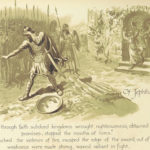We run our website the way we wished the whole internet worked: we provide high quality original content with no ads. We are funded solely by your direct support. Please consider supporting this project.

Where are the Blessed Peacemakers?
Religion Dispatches Magazine posted an article recently on embracing non-violence in the Christian tradition. In it, Elizabeth Drescher argues that the violent imagery in Paul’s writing accounts for a great deal of the violent posturing going on in churches today, but she also argues that these images have been misapplied and misunderstood. She challenges us that, “It is time…for Christian churches to atone for their own role in the culture of violence within which we all suffer by standing actively against it week upon week upon week in the pulpit and on the street.”
From the article:
The “armor of God,” too often turned to violent purposes, is comprised of truth, righteousness, and peace. Paul’s “helmet of salvation”—that which protects the center of human thought and reason—and “sword of the Spirit” are not of course acts of aggression, but words. Hence, likewise, the sword of justice wielded in the Revelation of John (Rev. 19:11-15)—the New Testament book most often cited in violent, apocalyptic Christian fantasies—extends from the mouth of the white-robed representation of the risen Christ. He slays the forces of cosmic evil not with physical aggression, but with the same “Word of God” that Paul calls out as the fundamental instrument of Christian faith, righteousness, and peace.
Christians, we seem to forget in all the clucking over the extent to which fried chicken sandwiches do or do not represent ideological preferences, are meant to use words, and to use them in particular for peace. This peace—the “Peace of Christ” in Christian tradition—is the heart of Christian teaching and practice, upon which rests everything from faithful stewardship of creation, to economic justice, to the rejection of violence as a solution for personal, familial, social, or political disagreements.
Image by Jayel Aheram. Sourced via Flickr.
Category: General
Tags: Non-Violence, Peacemaking
Related Reading

Sermon Clip: Hijabs At The Gym
In the last message of Mixed Signals, we take a look at Islam and how Kingdom people should be responding to the growing worldwide Islamic movement. We explore the growing disparity between the life Jesus led and calls us into and the normal worldly response to those who are different or potentially threaten our way…

Responding to Bullying
Robert Martin over at Abnormal Anabaptist posted this video on The Bullying Experiment. While I’m not convinced that shaming people who don’t intervene is an appropriate way to instigate change (shame rarely helps and you don’t know what fears may have kept someone from helping) I’m so impressed with some of the non-violent and courageous…

Jesus Came to Bring a Sword?
Jesus said: “Do not suppose that I have come to bring peace to the earth. I did not come to bring peace, but a sword” (Mt 10:34). Some, both modern scholars along with church leaders since the fourth century, have used this passage as evidence to argue that Jesus is not altogether non-violent. When we…

Does Hebrews 11 Praise Violence? A Response to Paul Copan (#2)
Once or twice a week, as time allows, I will be responding to criticisms of Crucifixion of the Warrior God (CWG) that were raised by Paul Copan in a recent paper that he delivered at the Evangelical Theological Society. In my first post in this series I responded to Copan’s claim that Paul’s quotation from…

Sermon Clip: Seeking Shalom
In this sermon clip, Greg Boyd shows how the Anabaptists seek after shalom in every part of their lives. All of us seek for peace in our lives, but peace is just a small part of God’s shalom. Shalom is right relatedness between us and God, each other, and creation. You can view the entire…

Podcast: What is Violence?
Greg takes a closer look at what violence is. Then he bullies Dan. http://traffic.libsyn.com/askgregboyd/Episode_0174.mp3
